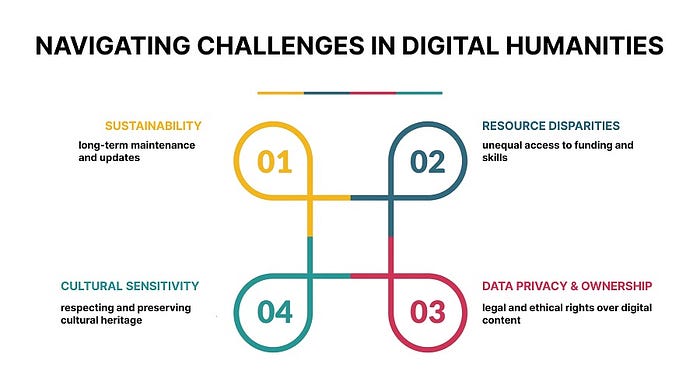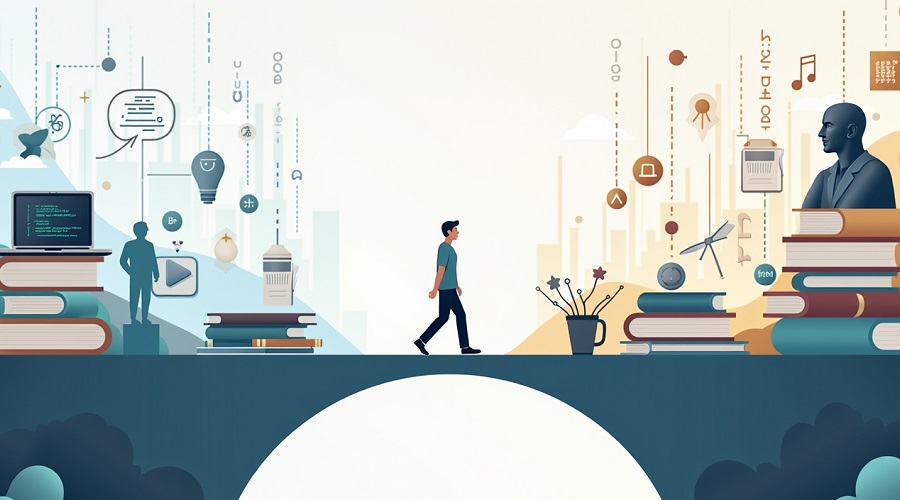When you roamed through dusty old libraries, you most probably dreamed of finding stories hidden in the pages. Imagine having that same material at hand now, analyzed with advanced technologies that help uncover patterns beyond human perception. Digital Humanities (DH) gives you the means to preserve and display cultural heritage, enabling inquiries such as:
- What steps can be taken to record your community’s oral traditions before they fade away?
- How does analyzing numerous letters written during the time period for India’s independence bring forth new insights?
When you link with DH, you transform personal research into a rich discourse among intellectuals, technology lovers, and yourself as a curious mind.
Core Components That Will Ignite Your Curiosity
- Digital Archives and Keeping Them Safe: Imagine the ability to navigate through 19th-century newspapers on your mobile device, allowing you to zoom into vague photographs and even read the notes written in the margins. Digital archives can offer you all this and more. Across the globe, institutions are inviting the public to peruse their collections by scanning rare books, maps, and even recordings of folk songs. Viewing Rabindranath Tagore’s manuscripts online makes his script feel tangible; it is a reminder that digitization is about more than preservation; it enables exploration.
- Text Mining and Analysis: Consider some of the common characteristics of regional literature. Relationships between authors, sentiment analysis and frequency analysis are key concepts studied within Computational Linguistics. Exploring issues, one can track how often a word like ‘sauraksha’ (safety) is mentioned in post-independence newspapers while observing spikes during significant political events. It helps to grasp the concepts better when data is visualized alongside evidence.
- Geospatial Humanities: While Maps tell stories, GIS maps bring them to life. Unlike basic maps, with GIS technology combines the data with maps which turns dull pictures into captivating pieces of art. Imagine portraying colonial trade routes in Bengal: as you follow the rivers and settlements, you add life and intrigue that others can witness. Such activities make students start to consider geography as more than just a physical location but as a vibrant, dynamic space influenced by people’s movements and choices.
- Digital Exhibitions and Interactive Storytelling: VR (Virtual Reality) and AR (Augmented Reality) are more than just entertainment. They reconstruct ancient temples, offer virtual tours of museums, and allow individuals to “walk” through historical festivals. With a VR headset, watching a Ganesh festival in the 17th century is much more than gazing at relics; one is absolutely in a different realm, surrounded by the scents of incense and the sounds of rituals. You actively smell, hear, and are a part of the experience. Interactive storytelling encapsulates you into the story, transforming engagement with the past into active involvement instead of passive observation.
- Collaborative research and crowdsourcing: ‘Digital humanities’ implies the use of technology to research and engage with communities at the regional level. Zooniverse is a perfect example, as it has volunteers working on transcription projects, picture categorization, video categorization and even map annotation. For example, some people help in cataloging colonial spy reports by marking the names of rivers and forts. Because of these volunteers, history is increasingly becoming more complete than what a single historian can tell. In these projects, anyone willing to help gets a chance to join a community which endeavors to increase the understanding of history.

How DH Transforms Your Learning Experience
By incorporating videos, audio clips, and interactive quizzes into digital texts, multimedia elements are integrated which transforms learning into an engaging experience. Rather than just reading about the Bhakti movement, one can interact with timelines, listen to devotional songs, and enjoy virtual tutorials to understand the evolution of script through calligraphy. Such experiences forge a deeper connection with learners and the topics of focus. Moreover, acquiring technical skills such as basic coding or GIS mapping allows the learner to tackle problems innovatively and collaborate across disciplines.
Challenges and Ethical Considerations You Should Know
DH provides wonderful possibilities, but at the same time, there are obstacles you need to manage:
- Resource Disparities: Funding and technical skills are often missing in lesser-known cultural organizations, rendering their collections unreachable. Where there is little funding, the process of digitization is often incomplete.
- Data Privacy & Ownership: Who holds the rights when you digitize an individual’s private diary or a community’s oral narrative? Think about permission and the legal aspects prior to putting any digital content out into the world.
- Cultural Sensitivity: How can one honor indigenous knowledge without falling into cultural appropriation? Approaching community representatives safeguards that digital portrayals capture their views.
- Sustainability: After launching a digital project, who takes care of maintaining and updating it with newer technologies? If you develop or manage DH projects, be ready for future maintenance and preservation planning.

Accepting these challenges makes sure technology enhances rather than eclipses people’s stories.
Gazing Ahead: The Roadmap for Digital Humanities
The very first glimpse of the potential value DH can provide is being showcased right now. With the up and coming technologies, your capabilities will be enhanced exponentially:
- Artificial Intelligence (AI): AI frameworks trained on local patterns that decipher centuries-old handwriting with exceptional precision are easy to imagine. As AI evolves, you will be able to analyze documents more quickly and accurately.
- Blockchain: Using blockchain technology can secure digital artifacts by timestamping every piece to guarantee authenticity and transparency. With blockchain implemented, one will know precisely when and how edits were made to a digital record.
- Global Collaborations: Dh will increasingly adopt multilingual and multicultural projects. You could work with colleagues across an ocean, integrating local folk narratives with broader worldviews. This collaboration broadens the scope of knowledge DH becomes a true collaborative frontier.
As these technologies grow, digital humanities “DH” will continue to influence the interactions you have with heritage and history.
Embracing Your DH Journey
Digital Humanities invites you to take on the dual role of both a creator and an observer. If you’re interested in exploring the realms of literature or history, mapping out historical trade routes, doing local history, or simply preserving oral history, you are being awaited in this community. Start your journey with self directed online archival queries, crowdsourcing, attending a digital storytelling workshop, or signing up for one. Each step you take brings you a little closer to infusing technology into human experience and creating profound digital works.
If you’re a researcher struggling to choose the right topic, you’re not alone. We’re here to support you with expert guidance tailored to your interests. Connect with us and begin your research journey with confidence.
Frequently Asked Questions
Q1. What falls under “Digital Humanities”?
Digitized Humanities or DH encompasses projects utilizing digital tools for humanities scholarship such as the digitization of archives, text mining literature, cultural mapping, and the creation of virtual exhibits. It is a broad term for anything done with technology and culture or history.
Q2. Do I need technical expertise to work in DH?
Not really. Competences like coding, database administration, or GIS are useful, but teamed up with experts in the field of humanities. Each creation, whether it’s an exhibit, can be done using Omeka and Voyant tools for text analysis and guides learners along the way.
Q3. How can small institutions with limited budgets participate?
Without spending a dime, institutions can present content using open-source platforms and other free tools such as Google Arts & Culture, Omeka, and Scalar. Smaller grants or collaboration with colleges can provide resources too.
Q4. What ethical considerations matter when digitizing artifacts?
Inquire: Who holds the copyright to the work? Is there any permission provided for the material to be scanned and disseminated? Are there folk lore taboos associated with the customs? Enjoy Working with Communities Consider community leaders or stakeholders for accurate depiction.
Q5. How do I stay updated on DH trends?
Keeping up with the DH journals (Digital Humanities Quarterly), attending workshops and webinars, and joining online forums like the Digital Humanities Slack group are great ways to participate. Engaging in Zooniverse projects helps to maintain that connection.





Comments